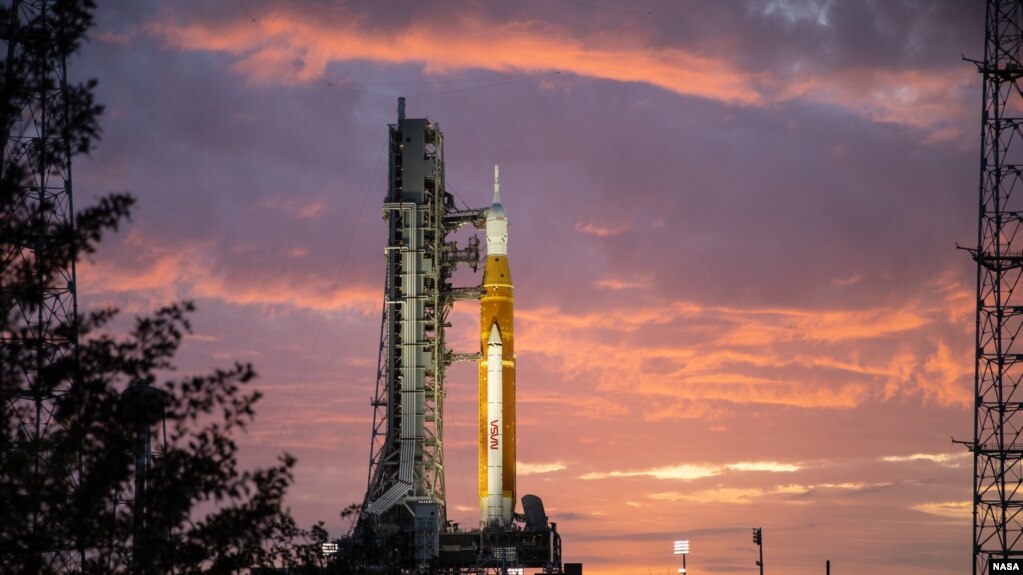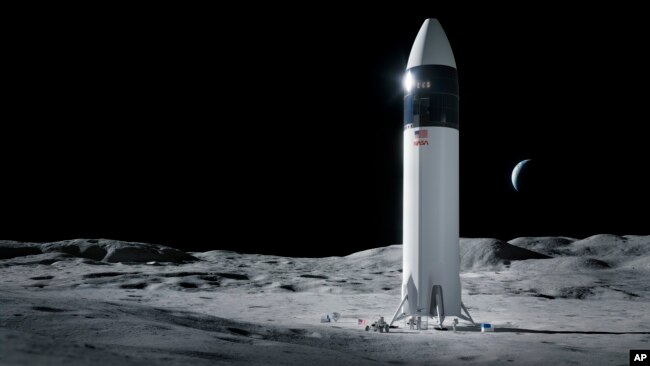
The Space Launch System (SLS) and Orion spacecraft are seen at NASA’s Kennedy Space Center on March 23, 2022. (Credit: NASA/Ben Smegelsky)
The American space agency NASA is carrying out final testing on its new rocket that aims to help return humans to the moon.
NASA says its Space Launch System, or SLS, is the most powerful rocket ever built. U.S. officials have said the rocket was designed to begin a new generation of human space exploration.
SLS is the first rocket designed to carry both astronauts and supplies on a single mission. It is part of NASA’s Artemis program, which aims to land the first woman and first person of color on the moon.
Artemis has a goal to land American astronauts on the moon no earlier than 2025. Last year, NASA pushed back the planned launch. It would be the first moon landing by astronauts since NASA’s Apollo 17 mission in 1972.
NASA is calling the first launch of the SLS rocket Artemis 1. There will be no crew on the spacecraft during the first mission. SLS will carry NASA’s Orion spacecraft on a test mission to fly around the moon.
NASA announced last year that it had chosen American company SpaceX as its partner to land the next astronauts on the moon. SpaceX has already completed several missions to carry astronauts to the International Space Station. SpaceX uses the Falcon 9 rocket and Crew Dragon spacecraft.
SpaceX also is developing and testing a human landing system (HLS) designed to put humans on the moon. NASA’s plan for the future calls for its SLS rocket to transport astronauts on the Orion spacecraft to lunar orbit. From there, astronauts would transfer to SpaceX’s HLS to be transported to the surface of the moon.
SpaceX has also developed a super heavy space vehicle called Starship. Company chief Elon Musk has said Starship is designed to transport astronauts to the moon, as well as possibly Mars. Unlike the SLS rocket, Starship is designed to be reusable. SpaceX plans to carry out a test flight to launch Starship into orbit sometime this year.

In addition to Starship, NASA announced earlier this month that it is seeking additional proposals from American companies to develop moon landers. The landers are to transport astronauts between lunar orbit and the moon’s surface.
NASA said landers should have the ability to link up with a future, lunar orbiting space station it plans to create called Gateway.
In preparation for its upcoming flight, SLS was recently transported to a launch structure in Cape Canaveral, Florida, for final testing operations. One of the next major tests for the system is called a “wet dress rehearsal.”

This preparation will involve engineers fully loading the rocket’s main fuel tanks with liquid hydrogen and liquid oxygen. Then, a simulated launch countdown will take place. The countdown will stop seconds before the rocket’s four RS-25 engines start. All other systems are to be fully examined and tested in the coming weeks.
Information from the tests will help decide when the rocket will be launched.
During the test mission, Orion will aim to travel 450,600 kilometers from Earth, and thousands of kilometers beyond the moon. NASA said this will be farther than any spacecraft built for humans has ever traveled. The mission is expected to last four to six weeks.
I’m Bryan Lynn.
Bryan Lynn wrote this report for VOA Learning English, based on reports from NASA, Reuters and The Associated Press.
We want to hear from you. Write to us in the Comments section, and visit WWW.VOA-STORY.COM
Quiz – NASA’s Most Powerful Rocket in Final Testing Before Launch
Start the Quiz to find out
____________________________________________________________
Words in This Story
mission – n. an important project or trip, especially involving space travel
dress rehearsal – n. the final rehearsal, or practice, for a live show or event
simulate – v. to do or make something that looks real, but is not